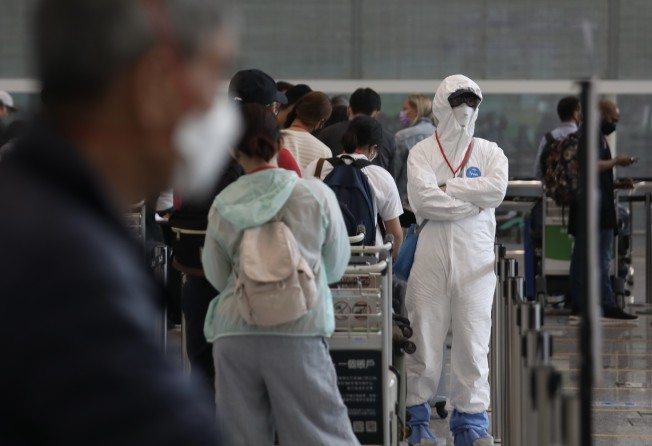
04:47
Hong Kong should follow Singapore’s lead and drop ‘zero case’ approach to Covid-19

The scrapping of plans for a Hong Kong-Singapore travel bubble last week was predictable, but its demise has far-reaching implications. The move highlights Hong Kong’s growing isolation from much of the world as it doggedly pursues a “zero-tolerance” approach to Covid-19.
The scheme, intended to allow quarantine-free travel between the two cities, was claimed as a world first. It was due to launch in November last year, but depended on cases in both places being kept to a minimal level which proved impossible.
Singapore has now switched to a more relaxed “live with the virus” strategy. This means tolerating a higher number of cases and makes the travel bubble unworkable. The Hong Kong government said Singapore’s shift in policy changed the basic premise underpinning the scheme.
In keeping with its new approach, Singapore will not require short-term visitors from Hong Kong and Macau to quarantine from August 26. Hong Kong’s “zero-case” strategy, meanwhile, means that measure will not be reciprocated.

04:47
Hong Kong should follow Singapore’s lead and drop ‘zero case’ approach to Covid-19
Those who have effectively been trapped in Hong Kong since Covid-19 emerged early last year will be greatly disheartened by predictions that the city’s travel restrictions, among the strictest in the world, will remain in place until 2023.
The problem Hong Kong faces is that Singapore’s new approach, involving opening up travel as vaccinations increase, mirrors that adopted by much of the rest of the world.
Many countries now accept it is impossible to eliminate Covid-19. They are removing restrictions and trying to get back to normal, despite fresh outbreaks and new, more transmissible, variants. Risks remain, but the “live with the virus” approach brings hope of both economic and social benefits.
The Singapore travel bubble was supposed to be the first of many. But health minister Sophia Chan Siu-chee on Saturday said Hong Kong was no longer in talks with other countries because of the difference in approaches to Covid-19.
Hong Kong continues to align with Beijing’s “zero-tolerance” strategy. Quarantine restrictions for arrivals from overseas were tightened yet again last week. Another 15 nations were added to the high-risk category, requiring three weeks in hotel quarantine. At least two weeks of incarceration awaits overseas arrivals from medium risk places. Once again, families have been separated and travel plans plunged into disarray.
China’s determination to stick to the “zero-case” policy is driven by worries about its relatively low level of intensive care beds, doubts about the efficacy of its vaccines, and the need for more people to get jabs. There are fears its health system will be overwhelmed if the virus takes hold. These are valid concerns that also, to an extent, apply in Hong Kong.
But Hong Kong’s status as an international city, already threatened by political developments, is at stake. Hong Kong desperately needs to open its doors to the outside world. This was underlined in an open letter to the chief executive from the European Chamber of Commerce last week.
The seemingly never ending travel restrictions are clearly contributing to the ongoing exodus of residents from Hong Kong. Many have given up on visits to their home country and have bought a one-way ticket instead.
Hong Kong cannot afford to be largely shut off from the rest of the world for much longer. It should not have to face a stark choice between opening international borders and lifting restrictions on travel to the mainland. Singapore’s nuanced approach makes sense. It is not throwing caution to the wind like the UK. Nor is it striving for an unattainable zero case objective.
As Hong Kong’s vaccination rate increases, it should drop the “zero case” policy and follow Singapore’s lead. Hong Kong is supposed to enjoy a high degree of autonomy from Beijing.
It should be free to adopt a different strategy to the mainland, given the importance of its status as an international city. Call it one country, two pandemic policies.
One figure in the tourism industry described its workers as “waiting for the light at the end of a never-ending tunnel”. That is what we will all feel like if steps are not taken to ease travel restrictions soon.